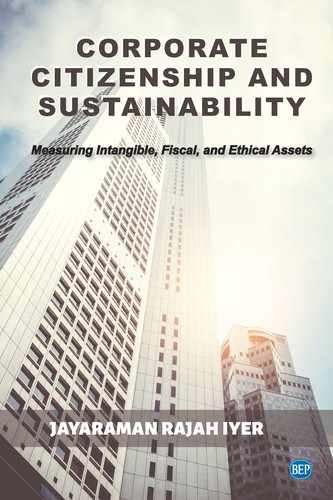Intangible is defined, like zero being found as a number. Intangible is proved as a constant, an energy force, with a fixed value in a specified mathematical context, enabling the accomplishment of an infinite succession of finite purposes by controlling each goal. Return on intangible inverts the corporate structure to create an equitable new stable element for corporate management, like that of the well-established mathematical and natural sciences. It enables preparing a CREAM—corporate governance, risk management, earnings, accounting quality, and management quality—Report measuring fiscal and ethical assets.
Furthermore, a blueprint for Gujarat state domestic product (GSDP) 2024 of $1.5 trillion, as illustrated in this book, establishes efforts per person (EPP) as the core denominator for development and plays a significant role in the construction of a macroeconomic model. Gross domestic product (GDP) figures are always delayed. The collateral damage, the delayed GDP data has inflicted on the UN Sustainable Development on Gross National Happiness (GNH) Index is obvious as the GNH index could not be linked to development. This has been rectified by bringing out a GDP–GNH combined index, covering the five criteria set by the CREAM Report. The bottom-to-top approach of preparing a CREAM Report and then providing a slot in the Creamchain for each individual enables participation and tracking the well-being and development for each person, individually and collectively at the same time.
Corporate citizenship is discussed. Since the days of Ashoka1 in 300 BC, there is not a single century that could be termed as a civilizational era, anywhere in the world. It is so because social values have not been addressed at all. Corporate citizenship, therefore, is at the cusp of the modern-cum-corporate civilization, where a GDP–GNH connect can get an entry, the book argues.
action process; Action Value Capital; corporate citizenship; CREAM Report - corporate governance, risk management, earnings, accounting quality, management quality; CREAM Report framework: corporate social responsibility, corporate fiscal responsibility, corporate ethical responsibility, subject - object distinction of qualitative and quantitative elements of management; creative process; EPP: efforts per person; ethical assets; GNH Index: gross national happiness index; GRACE: governance, responsibility, authority, credibility, enablement; IBCM - Inactivity Based Cost Management; Intangible Value Capital; Intellectual Value Capital; RoI - Return on Intangible; Reverse Mentoring; Self-governance; Sustainability: sustainability of efficiency, sustainability of profits, sustainability of value system.
1 Ashoka the Great was an Indian emperor who ruled almost all of the Indian subcontinent from c. 268 to 232 BCE. Ashoka’s edicts, in pillars and boulders and cave walls, distributed throughout the subcontinent brought out what might be called state, private, and individual morality. Author and historian H.G. Wells said, “Amidst the tens of thousands of names of monarchs that crowd the columns of history ... the name of Ashoka shines, and shines almost alone, a star.” The Edicts of Ashoka, Ven. S. Dhammika: https://www.cs.colostate.edu/~malaiya/ashoka.html.
